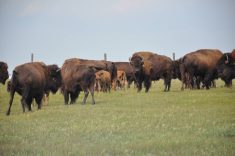DALEMEAD, Alta. – Darrel Winter hefts up a 16 pound frozen turkey and says with a grin, “look at the finish on that. Isn’t it beautiful?”
Since 1977, Darrel Winter and Corrine Dahm have been raising free-range turkeys that scratch out an easy-going, stress-free life in the sunshine of their southern Alberta farm.
“Scratching turkeys is what one of our customers call them because they are always scratching for food,” Winter said.
His father started the turkey business in 1958 with 145 birds on a mixed farm. He raised and dressed them at the Dalemead farm and sold them privately to customers in the Calgary area.
Read Also

Canadian Food Inspection Agency slammed for handling of bovine tuberculosis case
The federal government leans heavily on producers to “take one for the team” and risk their livelihoods without any reassurance of support.
Nowadays, the live birds are gathered and shipped to a government processor in St. Paul, an hour north of Edmonton.
Harvest comes twice a year.
Winter and Dahm have an 11,000-bird quota and handle all their own sales. Thanksgiving and Christmas orders are the most hectic, with fresh and frozen birds going to customers from Edmonton to Lethbridge. Many of their clients are corporate buyers who place large orders for staff Christmas gifts.
The Thanksgiving flock arrives June 1 and dress out at about 16 lb. The Christmas turkeys come in August. Some are allowed to grow bigger than 20 lb.
“We aim for a family sized turkey. And they’re just beautiful,” Winter said.
Each turkey carries the Winter’s Turkey brand name.
“People like to know where they come from. It seems to be important to people,” Dahm said.
In addition to traditional turkey, they have developed turkey steaks, smokies, jerky, breasts and pastrami. None of these products contain MSG, gluten or dairy products.
Not just special occasions
The couple hopes the specialty products entice people to eat more turkey.
Winter and Dahm eat turkey five times a week. They are convinced that consumption would soar if more people ate turkey at least once a month.
They hope a new organic flock will increase sales to people who want meat that is free of antibiotics and pesticides.
The organic birds are raised separately from the traditional turkeys. The farm has been inspected and cleared for organic production.
While organic production involves some management changes, Winter and Dahm haven’t deviated from their belief in tender loving care.
“We rely more on husbandry than medication,” Winter said.
“You can’t discount how important it is to have a strong bird to begin with. It has a lot better chance to do well.”
The turkeys receive plenty of clean bedding and a chance to move outdoors. As a bonus, classical music is piped into the barns.
The birds are not force-fed to make them grow faster. They don’t have crooked legs from carrying too much weight too soon.
“Performance is not a big issue for us. It is the quality of the product we’re aiming for,” Winter said.
Besides what they can scratch out of the ground, the turkeys receive a whole wheat ration with a small amount of forage. They eat 20 tonnes of gravel a year.
Turkeys require the small stones in their gizzards to digest food.















